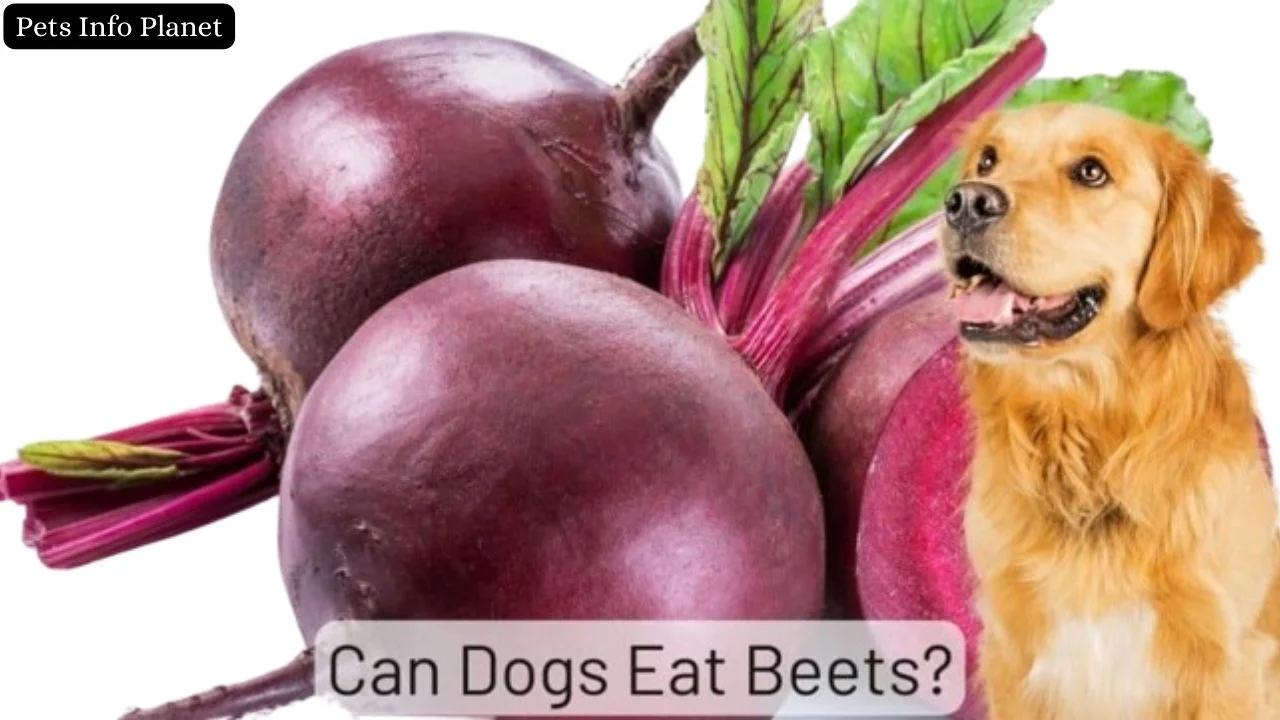If you’re a dog owner who loves incorporating healthy, natural foods into your furry friend’s diet, you may wonder, “Can dogs eat beets” The good news is that beet can be a safe and nutritious addition to your dog’s meals, provided they are prepared and served correctly. Beets are root vegetables known for their vibrant colors and numerous health benefits.
Packed with essential nutrients like fiber, folate, and manganese, beets can support your dog’s digestive health and overall well-being. However, it’s crucial to understand the proper way to introduce beets into your dog’s diet to ensure their safety and optimal enjoyment.
What is a beet
Beets, scientifically known as Beta vulgaris, are root vegetables famous for their vibrant color and unique flavor. They have a round or elongated shape with an outer skin that can range in color from deep red to golden yellow. Beets contain essential nutrients like fiber, folate, potassium, and vitamin C.
They are commonly used in various culinary applications, including salads, soups, juices, and pickles. Beets have a sweet and earthy taste that can be enjoyed raw and cooked. They are a versatile and nutritious vegetable that adds color and flavor to many dishes.
Are Beets Good For Dogs
Yes, beets can be good for dogs when given in moderation and prepared correctly. Beets are a nutrient-dense vegetable that offers various health benefits. They are a great source of fiber, which can aid digestion and promote bowel regularity in dogs. Beets also contain essential vitamins and minerals like folate, manganese, and potassium, which support overall health and well-being.
Additionally, beets contain antioxidants that can help protect against cellular damage and inflammation. However, it’s important to note that dogs are different; some may have specific dietary restrictions or sensitivities. It’s always recommended to consult with your veterinarian before introducing beets or any new food into your dog’s diet.
Beets Nutrition Facts
Here’s a table summarizing the nutrition facts for beets:
| Nutrient | Amount per 100g |
| Calories | 43 |
| Protein | 1.6g |
| Carbohydrates | 9.6g |
| Sugars | 6.8g |
| Dietary Fiber | 2.8g |
| Fat | 0.2g |
| Vitamin C | 4.9mg |
| Folate | 109mcg |
| Vitamin B6 | 0.1mg |
| Potassium | 325mg |
| Magnesium | 23mg |
| Iron | 0.8mg |
| Phosphorus | 40mg |
These values are approximate and may vary based on factors such as cooking methods and beet variety.
Benefits Of Feeding Beets For Dogs
Beets are packed with nutrients and offer various health benefits. Here are some of the key benefits of adding beets to your dog’s diet:
Nutritional Powerhouse:
Beets are packed with essential vitamins and minerals for optimal canine nutrition. They are a rich source of vitamin C, which supports the immune system, and folate, which aids cell growth and development. Beets also provide potassium, essential for proper muscle and nerve function, and manganese, which helps with bone health and metabolism.
Digestive Health Support:
The high fiber content in beets promotes healthy digestion in dogs. Fiber adds bulk to the stool, preventing constipation and supporting regular bowel movements. It also acts as a prebiotic, nourishing the beneficial bacteria in the gut and promoting a healthy digestive system.
Anti-Inflammatory Effects:
Beets contain betalains, natural compounds with potent antioxidant and anti-inflammatory properties. These compounds can help reduce dog inflammation, making beets beneficial for dogs with arthritis or allergies.
Detoxification Support:
Beets support liver function and help with detoxification in dogs. The betalains in beets stimulate the liver’s natural detox enzymes, aiding in eliminating toxins from the body.
Heart Health Promotion:
Beets are rich in nitrates, which can promote cardiovascular health in dogs. Nitrates help dilate blood vessels, improving blood flow and lowering blood pressure. This can be particularly beneficial for dogs with heart conditions or those at risk of developing heart problems.
Improved Immune Function:
Beets are a good source of immune-boosting nutrients like vitamin C and antioxidants. These nutrients support a robust immune system in dogs, helping them fight infections and diseases.
Weight Management Aid:
Beets are low in calories and fiber, making them a suitable addition to a weight management diet for dogs. The fiber content provides a feeling of fullness, which can help prevent overeating and contribute to maintaining a healthy weight in dogs.
Urinary Health Support:
Beets have natural diuretic properties, promoting urine production and helping flush out toxins from the urinary system. This can benefit dogs with urinary tract issues or those prone to infections.
Improved Energy and Stamina:
The nitrates in beets can enhance oxygen utilization and increase endurance in dogs. Feeding beets or beet-based supplements may help improve energy levels and stamina, especially in active or sporting dogs.
Delicious and Nutritious Treat Option:
Many dogs enjoy the taste of beets, making them a healthy and flavorful treat option. Incorporating beets into homemade dog treats or using them as a topper for meals can provide nutritional benefits and a tasty reward for your furry friend.
When introducing beets to your dog’s diet, it’s essential to do so gradually and in moderation. Start with small amounts and observe your dog’s response. As with any dietary changes, it’s always best to consult your veterinarian to ensure that feeding beets align with your dog’s specific nutritional needs and any existing health conditions.
How To Prepare Beets For Dogs

Beets can be a healthy treat for your furry friend. Here’s a simple way to prepare them for dogs:
Selecting and Cleaning Beets
When preparing beets for your dog, choose fresh, organic beets whenever possible. Look for firm beets without any soft spots or signs of mold. Before cooking, rinse the beets thoroughly under cold water to remove any dirt or debris. Trim off the beet greens, which can be challenging for dogs to digest.
Cooking Beets for Dogs
There are several ways to cook beets for your dog. A straightforward method is to boil the beets until they are tender. Place the whole beets in water, boil them, and simmer until they are easily pierced with a fork. Another option is to roast the beets in the oven. Wrap each beet in aluminum foil and bake at 400°F (200°C) until soft and easily peeled.
Peeling and Chopping Beets
Once the beets are cooked, allow them to cool before handling. To peel the beets, use a knife or your fingers to remove the skin, which should come off quickly. Be careful, as beet juice can stain surfaces and fabrics. Chop the beets into small, bite-sized pieces for your dog. This will make it easier for them to eat and digest.
Serving Beets to Your Dog
When serving beets to your dog, start with small portions to ensure they tolerate them well. Mix the chopped beets with your dog’s food or serve them as a standalone treat. Remember that moderation is vital, as too many beets can cause digestive upset. Monitor your dog for any adverse reactions, such as diarrhea or vomiting, and consult your veterinarian if you have any concerns.
Remember, it’s always a good idea to check with your vet before introducing new foods to your dog’s diet, especially if they have any existing health conditions.
Can Dogs Eat Beets Cooked
Yes, dogs can eat cooked beets. Beets are safe for dogs to consume when cooked as long as they are prepared plain without any seasonings, spices, or added salt. Cooking beets makes them softer and more accessible for dogs to chew and digest. You can boil, steam, or roast beets for your furry friend.
Remember to introduce beets gradually into your dog’s diet and watch for any signs of allergies or digestive upset. While beets can be a healthy addition to a dog’s diet, they should be given in moderation, and it’s always best to consult with a veterinarian before making any dietary changes.
Can Dogs Eat Beets Raw
Yes, dogs can eat raw beets, but it’s essential to consider a few factors. Raw beets are more problematic for dogs to chew and digest than cooked beets. Some dogs may have trouble breaking down the tough fibers in raw beets, leading to digestive upset or potential blockages.
It’s recommended to grate or finely chop raw beets before offering them to your dog to make them easier to consume. Additionally, be aware that raw beets may have a more intense flavour and may be less appealing to some dogs. As always, introduce new foods gradually and monitor your dog for any adverse reactions.
Can Dogs Eat Pickled Beets
It’s generally not recommended to feed pickled beets to dogs. Pickled beets are typically prepared with vinegar, salt, and other seasonings, which can be harmful or even toxic to dogs in large amounts. The high sodium content in pickled beets can be particularly problematic for dogs, as excessive salt intake can lead to dehydration and other health issues.
Additionally, the intense flavours and spices used in pickling may not agree with a dog’s digestive system and could cause stomach upset or digestive disturbances. It’s best to stick to plain, cooked beets when offering them to your dog as a treat.
Conclusion
In conclusion, the answer to “Can dogs eat beets” is a resounding yes, with several key considerations. Being a nutritional powerhouse, Beets bring a range of benefits to your canine companion. From supporting digestive health, providing essential vitamins, offering anti-inflammatory effects, and aiding in detoxification, beets can be a valuable addition to your dog’s diet when introduced in moderation.
Careful preparation is crucial—opt for fresh beets, avoid seasonings, and serve in small, manageable portions. Whether cooked or raw, beets offer versatility, though pickled beets are best avoided due to potentially harmful additives. As always, consult your vet for advice on incorporating beets into your dog’s meals.
